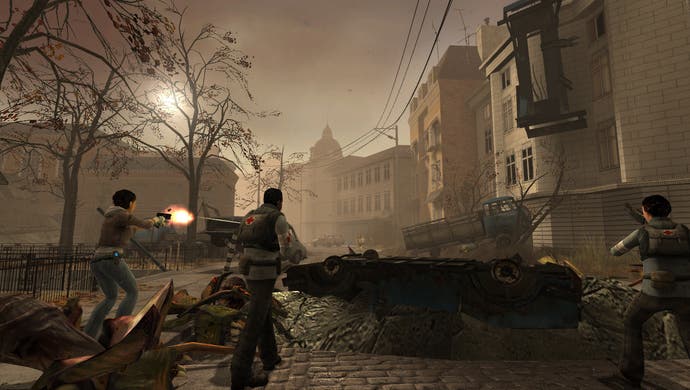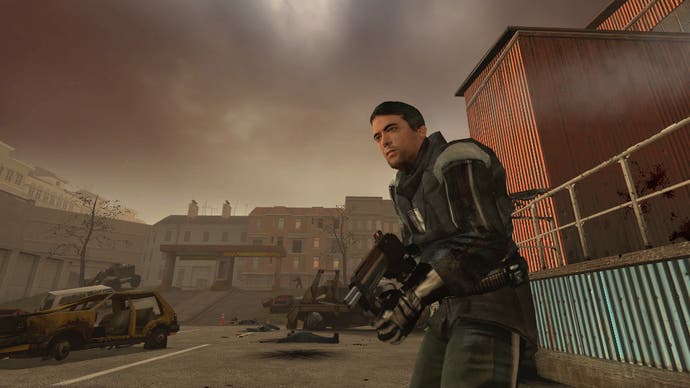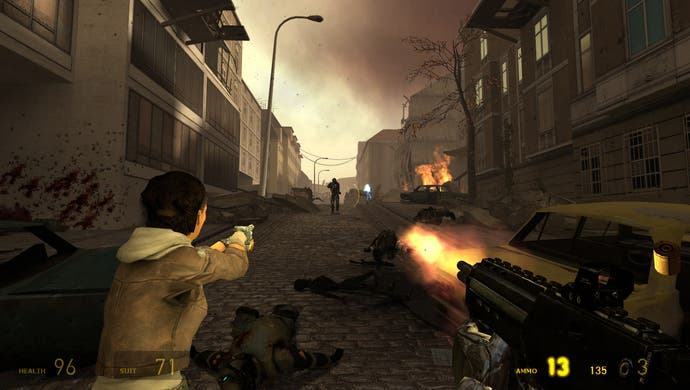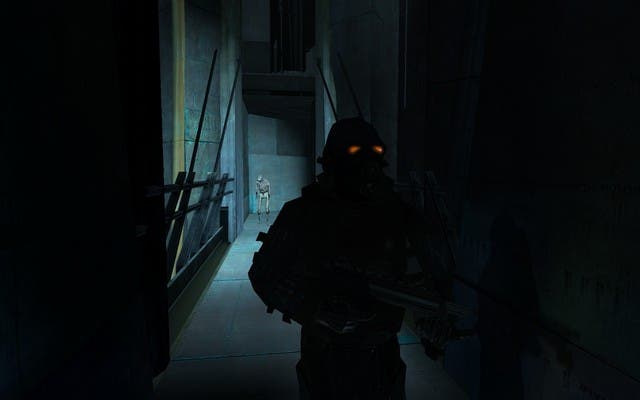Opening the Valve
Gabe Newell and co. on Hollywood, Episode One and future expansions.
So, with Episode One, we're doing a bunch of stuff on the tech side, but people will be pretty familiar with it. One of the things we've always tried to do is be really scalable so that people on the low end can play at acceptable frame rates and people at the high end feel like we're fully taking advantage of all the hardware that they bought. When we did the Xbox version of HL2 that gave us an opportunity to focus a bunch on performance optimisations, and with Episode One we're going to be shipping with performance optimisations back on the PC, so lots of things have gotten a lot faster.
In some cases it's given us the opportunity to expand the content budget, so we still want to render the low-end hardware, but now animation's three times faster, so that means we can put a lot more animation in there or increase the frame rate.

On the high end we've added this new Ultra mode which takes advantage of the latest greatest hardware - our pixel shaders are about twice as long in Episode One, you get per pixel specularity, there's some volume shading on the lighting, you'll see Al looks a lot better than in Half-Life 2. We've continued to move the rendering technology forward as we go along. It'll be interesting to see how people respond to this because one of the things we're trying out in Episode One - and one of the advantages of going with episodic content is that, the kind of approach we use with characters and lighting in Half-Life 2 is to let the lighting in the world do all of the work.
It's sort of like picking up a camcorder and filming the world as opposed to like in an action movie where all this very dramatic lighting is not possible. It's like you can't be in the real world and have this kind of lighting you see in movies like Mission Impossible III. That only happens when you've got a whole bunch of people standing behind the camera to make the scene look as cool as possible - so we're trying that out using the extra horsepower we have on the pixel shader side. You'll see that a lot - we think it looks better, it makes Al look a lot nicer.
They all sucked!
They're just bad movies - movies that shouldn't get made. I'm a huge fan of movies, I love going to movies and we have absolutely no reason to do it. It's not like they've offered us these giant buckets of cash and said "let us go and ruin your game" [laughs]. They offer you little tiny amounts of cash, so it's like they've not even tried to bribe us to go and make a bad movie. So it's the one thing we're going to hold on to. Unless it's a great movie, unless it's as exciting a movie as the game was a game then it will never get made.
We've tried that, but we've ended up with really uninspired scripts. It's just not going to happen until we think that there's a director and a cast and a script and can say this is a movie we'd like to go and see, and not just some vanity piece. We've seen what happens to those sorts of movies and the world would be a better place if nine tenths of those projects had never happened.
You've got a few hours of your life back.

No, I just think that there's an attitude right now that they're trying to exploit the built-in audience of gamers right now and they don't really care whether the movies are any good. I think there's also this element of financing in Germany where they don't really care how profitable the movies are either, so you have this collision of people who are not long-term stakeholders who just think 'what are the next five movies I can crank out before the German government closes this tax loophole?' and 95 per cent of the gaming movies are being made specifically for those reasons.
Yes [longest sigh ever]. I have to put on my professional 'I'm doing this for the company' hat, not the 'I'm a movie go-er whose soul is going to be crushed by another unbelievably crappy game adaptation' one.
I haven't seen that one, I'm looking forward to seeing that.
Another thing players will see with Al is that we're using the second version of our facial animation system, so she will have a much more robust set of expressions. The lip-synching is even better, and there are more subtle emotions that she can communicate now. She's got three times as many animations this time around and three times the textures.
There's new tech in there as well - she can handle a much more extreme range of emotions than she was able to before, and we're just making sure faces hold up on that, you know, massive stretching and stuff like that is a large part of the new rev of the technology.

I would be hard pressed... I mean, we've got a pretty good idea of what other people are doing and I do think that Al is considerably more robust than any other character that's been created in a videogame.
One of the things we've spent a lot of time on with our characters is making sure that the AI in the game and everything around it drives that system. It's one thing to make a character which has a facial structure that is capable of displaying an animation if your animator gets here and there and stretches all the sliders around. The next step beyond that is to getting to a point where Al is the character and the AI is making the decision that she should look like this under these circumstances or she should look unhappy, and so on. There are things in our system I don't think we've even seen anyone else try and tackle yet.
Al is with you 90 per cent of the game. It gets back to the point about tech demos versus actual technology in the game. The cool stuff happens when you connect that technology to all the other elements in the game, like you connect the facial animation system to the combat and to the puzzles and so on - and that's where 70 per cent of the work is. It's a valuable problem to solve.
Not today! [laughs]
One of the tools that Steam is giving us right now is the ability to have a much clearer idea of what's really happening with customers, so with Episode One, one of the things we're doing is to gather information. One of our secret weapons so far has been playtesting. We started playtesting our game very early on. We bring in hundreds of people externally - you have to sit there and just watch them play, and every time they get frustrated, every time get stuck, you know, that's a defect and you have to go and figure out how to fix that, and we just keep doing that until people can play through successfully and can have fun.

I think we're better at it, in terms of learning how to anticipate. It's like after you've watched a couple of hundred playtests, you start to develop a much better sense of what are successful and unsuccessful design strategies. And so the thing we're going to do with Episode One is to extend that out to all of the people. Essentially playtests create a proxy for what will happen when the game is being played, but with Episode One we're saying let's stop using the proxy and watch how people play. Rather than having hundreds of playtesters, there are eight million Steam accounts right now, so we'll have eight million playtesters. It tells us which weapons they're using, so we can say "they're not using this weapon, why not?", here's where people are getting stuck "huh, ok, they're not supposed to be stuck here". Here's the stuff they like, here's the stuff they don't like.
Yeah. We started this process with the hardware survey and that turned out to be incredibly valuable - it just helps you make really good decision. You're sitting there saying "should we optimise software skinning? - Yeah!" Here's another example: when you do performance optimisations you're pretending that you have an idea of what the target hardware is like. One of the things we got feedback on was level loads, so we wrote a bunch of tech to make level loads faster. We thought, why don't we actually just find out what's going on when levels are being loaded? And with our beta test group using the statistics gathering stuff it turned out that the real problem was, the real honest-to-god problem not the 'I'm an engineer and I want to go write code' problem was that everybody's game files were horribly fragmented, so the real solution wasn't to go off and write fancy background stuff. The real solution was to detect fragmentation and automatically defragment it, so one of the things that's gone out is an automatic defragmentation capability that just says 'oh, these things are fragmented, fix them'.
But the point isn't that, but to find out what's really going on. Rather than having internal guesses as to what's going on we're going to really see how customers play, and really see what's determining performance in customer's hands, and that's going to be big stuff for us.
Yeah, we have a couple...
This year, yes.
Yes, now that Episode One's done.
Check back later this week for more on this extensive exclusive interview from Valve, where the team detail more on the making of Half Life: Episode One.
